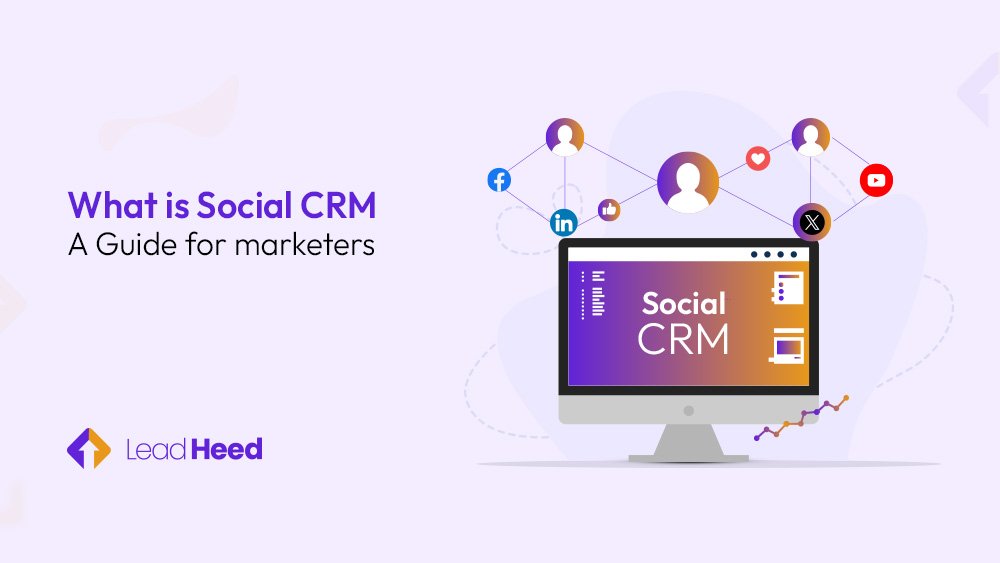Modern marketing is much more complex than you can imagine. As social interactions become central to the buyer journey, adapting is no longer optional. Marketers now need single, real-time solutions that capture all customer touchpoints. This is where Social CRM makes a difference.
Social CRM levels up the customer relationships by meeting their demands and using smarter tools. In this guide, you’ll discover how Social media CRM helps unify social data, streamline interactions, and create more meaningful relationships that drive long-term growth.
What is a Social Media CRM platform?
Social media CRM (Customer Relationship Management) refers to the integration of CRM with social media channels to foster customer interactions across platforms for better customer engagement. This enables your businesses to communicate with your clients in real time via social media platforms.
Such a CRM empowers your teams to know customers better by gaining valuable insights into customer sentiment and behavior. This leads to better customer service, builds stronger customer relationships, and fosters loyalty.
Why do Businesses Need Social CRM in 2026?
In 2026, businesses need social CRM to reach a wider audience, boost brand awareness, attract new clients, and provide high-quality content to existing ones. With the growing use of social media platforms, it has become an integral part of daily life. A social CRM provides a clear view of customer behavior by combining an ordinary CRM with social media insights.
This helps businesses to reach a larger number of clients, generate leads, increase sales, and boost overall productivity. Since, communication is all that matters coming to 2026, Social CRM helps businesses stay responsive and relevant.
What are the Benefits of Social CRM?
Social CRM enables businesses to build strong customer relationships by combining social media with existing CRM technology. By allowing you to publish more relevant content, respond faster, and interact with customers in real time, it generates more leads, boosts sales, and increases customer loyalty. Here’s a brief overview of how Social media CRM can make a difference.
1. Publish Relevant Content
Social CRM ensures the publishing of relevant content to its clients. Social CRM makes connecting with customers easier since it offers benefits such as real-time interaction and a smooth experience across multiple channels. Your business can reach customers on social media where they are active.
On social media, customers naturally share opinions and ask questions. They give feedback using social media. In order to improve your customer service, social CRM lets you gain some perceptions, listen much more closely, and join in these conversations.
2. Deliver Better Customer Care
Social CRM allows you to deliver better customer care by enhancing your understanding of customer behavior. A social CRM enables you to connect with your customers on social media platforms like Facebook, Twitter, etc., in real-time. This gives teams the details they need to provide excellent customer service to many customers at once. Further, it facilitates quicker responses to resolve issues in a timely manner, leading to improved customer service..
3. Generate Leads and Increase Sales
Social CRM helps generate leads and ultimately increases sales by identifying potential leads through social media channels. This allows your marketing teams to focus on leads that are likely to convert into valuable customers. The system is capable of tracking down potential customers by evaluating their interaction on social media. This helps to target them with relevant marketing messages.
4. Increased Customer Satisfaction and Loyalty
Social CRM enhances customer satisfaction and fosters loyalty. Such a CRM eliminates obstacles, allowing direct interaction with every customer, fostering stronger, durable relationships. It integrates effortlessly with email and phone, providing a consistent, seamless experience.
Additionally, social CRM provides deep insights into your customers’ preferences, enabling you to deliver highly personalized services. This customization enhances customer experiences, strengthens customer satisfaction, and builds long-term loyalty.
5. Data-Driven Decision Making
Social CRM supports data-driven decision-making by providing a 360-degree view of your customers. By maintaining a separate profile for each customer, it records all their interactions across social media platforms. This involves customer preferences, feedback, and reviews relating to specific products. This information allows you to make informed decisions, including personalizing marketing efforts, improving your products, or filling service gaps.
Social CRM vs Traditional CRM: What’s the Difference?
The key differences between traditional and social CRM are how they manage customer relationships. Traditional CRM focuses on managing customer data, sales, and internal processes, while social CRM integrates social media to enable real-time customer engagement and two-way communication.
| Aspect | Traditional CRM | Social CRM |
| Definition | Traditional CRM is a system that manages all your customer interactions. | Social CRM is an extended version of traditional CRM that integrates social media platforms. |
| Primary goal | Closing deals faster with targeted prospects. | Emphasizes meaningful interactions to meet customer needs and build relationships. |
| Integration channels | Integrates with email platforms, sales, and marketing automation tools. | Integrates with social media platforms like Facebook, Twitter, and LinkedIn. |
| Information Sources | Based on structured data and past transactions. | Based on data collected from social media. (e.g., comment, likes) |
| Personalization | Uses historical data to evaluate customer preferences, needs, and demands. | Uses real-time social media data for current, tailored customer interactions. |
| Priority features | Process-focused, with streamlined processes and step-by-step progressions. | Conversation-focused, with flexible processes based on customer social media activity. |
| Communication | Driven by data: campaigns, sales calls, emails, etc. | Driven by content: posts, blog, messages, etc. |
| Feedback collection | Surveys, support calls, and forms. | Social listening, online reviews, and real-time feedback.
|
Social CRM Challenges
Despite having several benefits, Social CRM comes with some challenges that businesses must face. These involve customer complaints and negative feedback, data overload and management, data privacy concerns, and lack of immediate results. In this section, you’ll discover how these challenges can become obstacles to business success and how you can effectively manage them to get the most out of your Social CRM strategy.
1. Customer Complaints and Negative Feedback
The major challenges faced while using social CRM are customer complaints and negative feedback. Social media platforms are public spaces accessible to millions of users. In this scenario, if any customer posts a negative review about your brand, it could quickly become the talk of the town. This damages your brand reputation, ultimately leading to a loss of customers and decreased sales.
2. Data Overload and Management
Another challenge in social CRM is data overload and management. A large amount of data is collected from social media platforms, making it difficult to identify meaningful insights that benefit your business. This requires advanced data management tools, analytics, and strategies to organize valuable information, which isn’t affordable to small businesses.
3. Real-Time Engagement Demands
Social CRM demands real-time engagement, and delayed responses cause frustration among customers. Customers demand immediate response, and their expectations are rising more than ever. To meet these expectations, it requires dedicated teams, monitoring tools, and efficient workflows. This helps to ensure no message goes unanswered.
4. Data Privacy and Concern
Social CRM struggles with customer data privacy and concerns due to the diversity of social media platforms. Customers are concerned about how their information is used, and the mishandling of such information weakens trust. Therefore, social CRM requires clear policies and regulations ensuring transparency to build trust, fostering stronger customer relationships.
5. No Immediate Results
Unlike traditional CRM, which shows quicker results, Social CRM takes time to collect and organize customer feedback. It also takes time to build trust and loyalty, especially when your brand is new. This requires consistent marketing effort and meaningful content. By improving customer service continuously, Social CRM minimizes risks and paves the way for stronger, more meaningful customer relationships.
The Future of Social CRM in 2026
The future of Social CRM holds great possibilities. In 2026, it will be more intelligent, personalized, and seamless, driven by technological advancements. Businesses will use artificial intelligence and machine learning to analyze vast amounts of social media data, enabling them to understand customer preferences and behaviors with greater precision.
As a result, customers receive tailored recommendations and responses in real time, enhancing satisfaction and loyalty. Social CRM will also engage with emerging technologies like voice assistants and augmented reality. This will enable customers to interact with brands and have fun easily. Routine tasks like responding to common questions will be automated, freeing up teams to focus on building good customer relationships.
What is Social Listening?
Social listening is the aspect of social CRM by which it gathers information of your product from social media based on the feedback given by customers in online platform. This tool helps to discover your customers’ opinions about your product, their strengths and weaknesses.
How Social CRM Affects Customer Experience?
Social CRM enhances customer experience by increasing customer engagement, providing faster responses, personalized services, and ultimately leading to stronger customer relationships. This allows direct interaction with your customers, enabling faster responses and personalized services.
Everyone wants to be appreciated and valued, and with social CRM, you can make that happen. By communicating with the customers in real-time and recommending products that match their needs, you can earn lasting loyalty.
Additionally, it helps businesses identify potential issues through reviews, posts, and complaints and resolve those without delay. By addressing these concerns in a timely manner, businesses foster happy customers with loyalty to the brand.
What Makes LeadHeed the Best Social CRM?
LeadHeed is one of the best social CRM that simplifies customer management with a user-friendly interface. This involves gathering data from social media platforms and organizing it at a centralized location. As a result, it allows for personalized services that make your customers feel valued and heard. This helps you in enhancing customer experiences, increasing leads, and overall brand value of your product.
Moreover, LeadHeed offers live monitoring, seamless integration, and smart automation tools. Marketers achieve certainty, speed, and efficiency with LeadHeed all in one place. LeadHeed grows with your business from startups to enterprises, with customizable features.
What are the Top 3 Essential Social CRM Strategies?
The top 3 essential Social CRM strategies are Aligning objectives, Personalizing customer interactions, and Monitoring customer feedback. These strategies focus on building stronger customer relationships, improving engagement, and driving meaningful conversations across social platforms.
1. Aligning Objectives
Aligning objectives means matching your social CRM functions with your business goals. Ensure these goals are SMART, i.e., specific, measurable, achievable, relevant, and time-bound. This helps ensure each action of social CRM contributes to a meaningful purpose.
For example, if a business aims to enhance customer satisfaction, the social CRM must focus on streamlining response times on social media platforms. By aligning CRM functions with SMART goals, businesses can prioritize resources effectively and measure outcomes.
2. Personalizing Customer Interactions
Personalizing customer interactions is a beneficial strategy for ensuring business success. Adopting such a strategy makes your customers feel connected to your business, leading them to be loyal. This, in turn, helps in increasing sales and revenue, resulting in improved efficiency.
3. Monitoring Customer Feedback
Monitoring customer feedback is an important strategy while implementing social CRM. This helps businesses track and analyze customer reviews, advice, and complaints about their product on social media. When a customer expresses dissatisfaction with your product on social media, their feedback highlights specific areas for improvement. This enables your business to make required enhancements and boost overall customer satisfaction.
Conclusion
Social CRM is a powerful tool for marketers looking to enhance customer relationships and drive business growth. By integrating CRM systems with social media, businesses can engage with customers more effectively, gather valuable insights, and build lasting brand loyalty. As the digital landscape continues to evolve, Social CRM offers a dynamic and adaptable approach to meeting customer needs and expectations.
While it comes with some challenges like negative feedback, data overload, data privacy, and concerns, the benefits, such as increased sales, customer loyalty, and smarter decision-making, outweigh the downsides. With the right social CRM like LeadHeed, you can ensure your business’s success faster with better customer engagement, real-time insights, and personalized experiences that build lasting relationships.
Frequently Asked Questions (FAQs)
Social CRM is the process of integrating your existing traditional CRM with social media platforms like Facebook, Instagram, LinkedIn, etc, with the primary goal to meet customer needs and build relationships through meaningful interactions.
To implement social CRM, start by analyzing your current social presence, selecting the right social media management tools, and integrating your CRM with social media. Also, monitor its performance actively and make necessary improvements.
A social media CRM platform is a tool that allows your CRM to integrate with social media platforms to communicate with your customers in real-time.
What are the benefits of Social crm?
The benefits of social CRM are: Publish Relevant Content, Deliver better Customer Care.
Generate Leads and Increase Sales, Increased Customer Satisfaction and Loyalty, and Data-Driven decision making.
Social CRM is important for your business to reach a wider audience, boost brand awareness, attract new clients, and provide high-quality content to existing ones.



